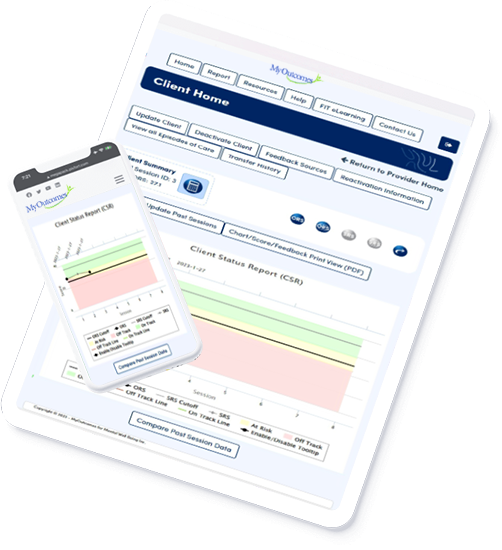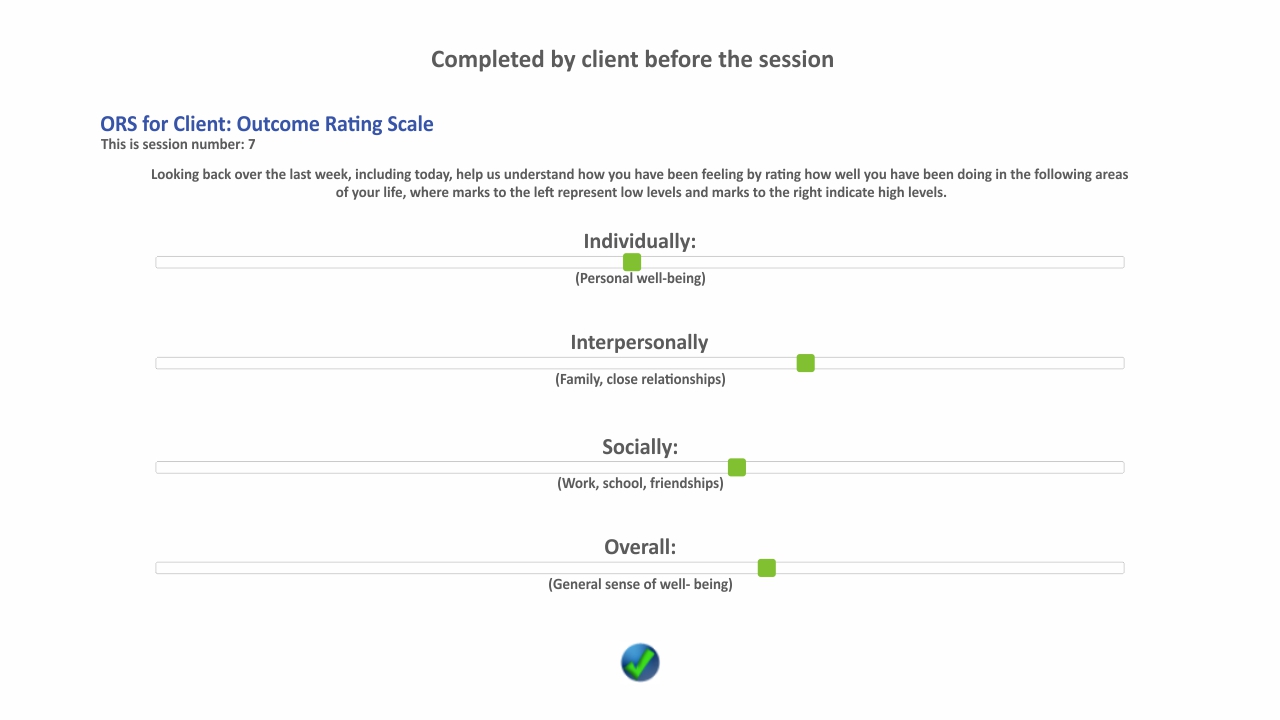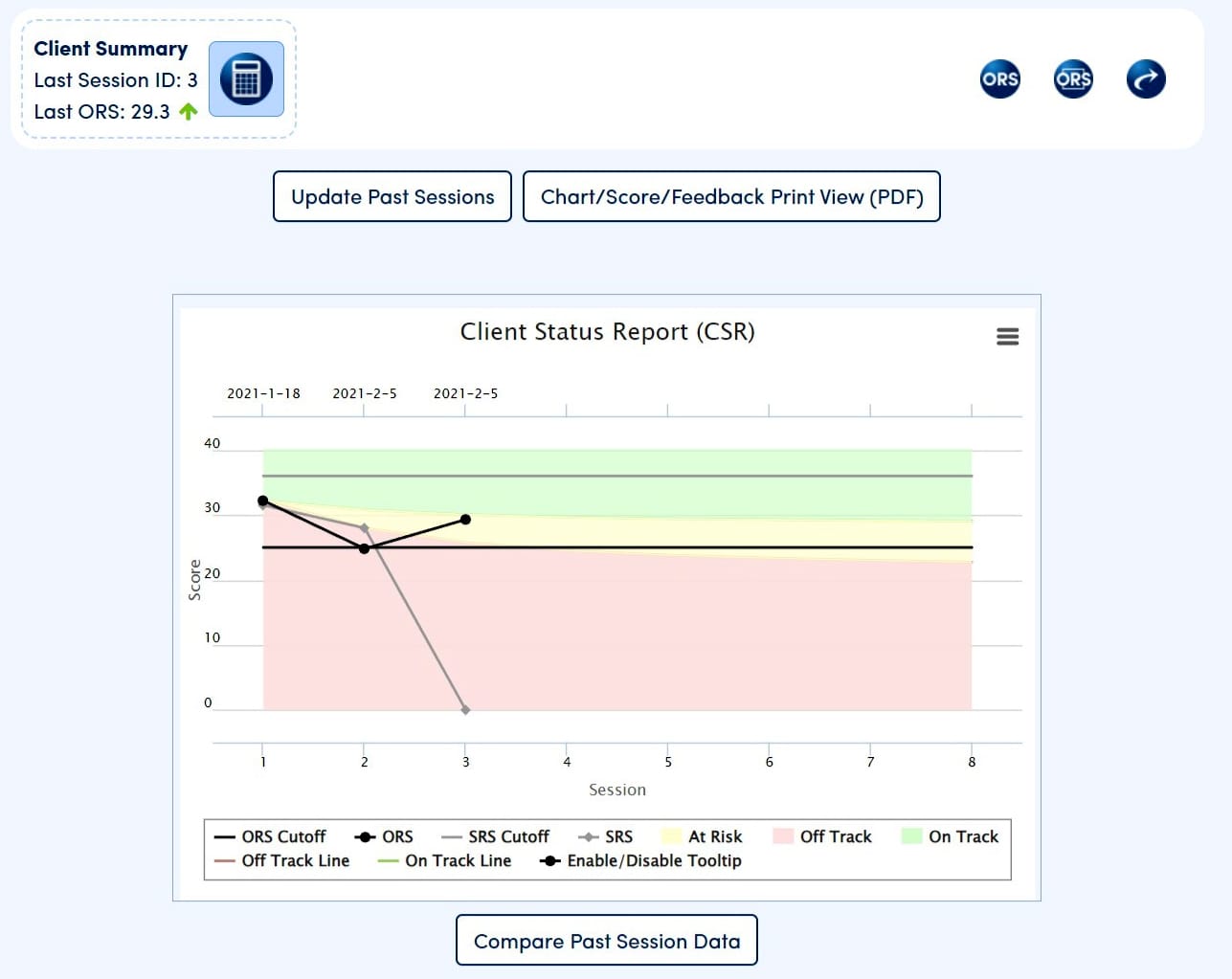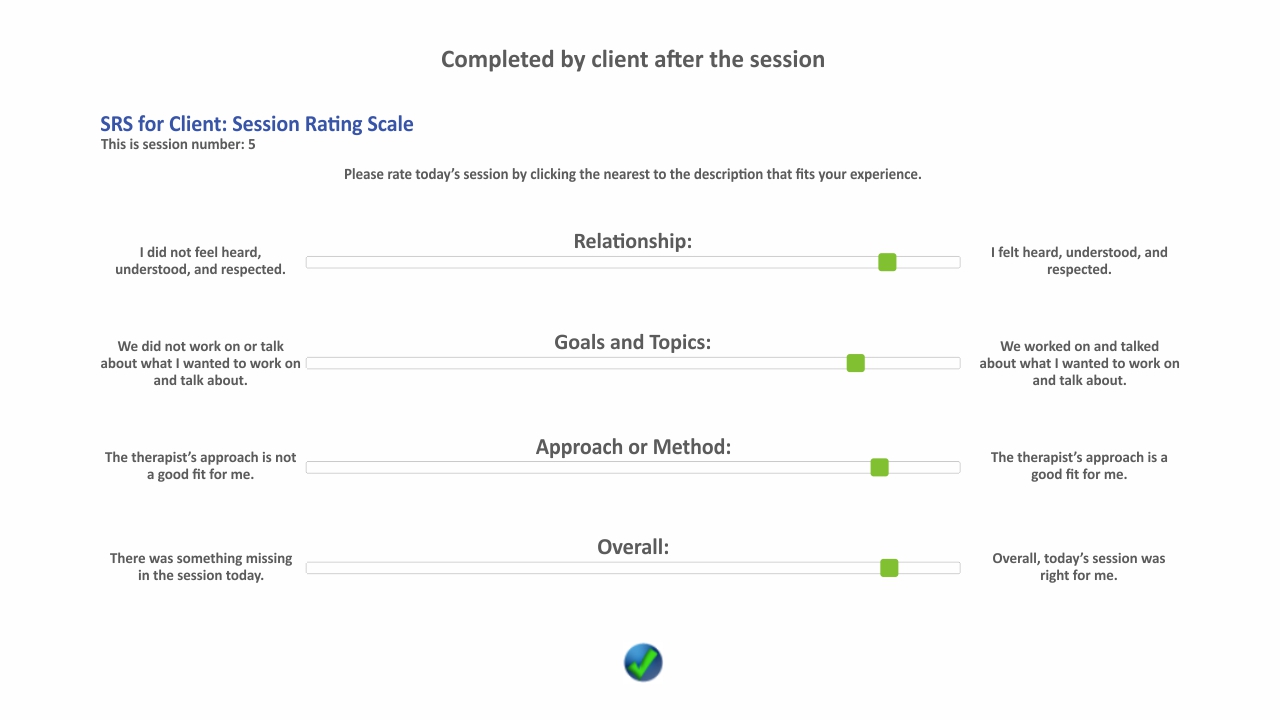The FIT (Feedback-Informed Treatment) model can be divided into two parts:
- a 1 minute, 4 question survey given to clients at the beginning of the session called the ORS (Outcome Rating Scale);
- a 1 minute, 4 question survey called the SRS (Session Rating Scale) completed towards the session’s end.

With considerable research demonstrating its reliability and validity, the ORS provides the therapist with insight into the client’s perception of their functioning on four psychosocial measures as well as changes in those four areas. With matched levels of reliability and validity, the SRS provides insight into four areas of the therapeutic alliance. The FIT model (ORS & SRS) is registered with SAMHSA as an evidence-based clinical tool.
MyOutcomes pioneered electronically administering the ORS and SRS. As such, MyOutcomes is, without a doubt, the Gold Standard for outcome measures, leading the pack in all possible metrics.
As a replacement for the paper version, MyOutcomes radically improves upon the effectiveness and feasibility of administering the two surveys each session. And the consistent, regular administration of the ORS and SRS has been demonstrated to play an important role in achieving successful outcomes. One of the most important reasons is that the client feedback can be utilized immediately. Changes in the ORS either towards or away from a successful outcome can be noted and addressed by the client and therapist immediately, instead of working in the dark as to what progress the client is actually making. Administration of the SRS each session enables the therapist to see immediately where the client thinks the therapeutic relationship is not working, and, with the client, address how to improve those areas.
Probably one of the most powerful arguments justifying the utilization of MyOutcomes is associated with its having pioneered this field. Since 2008, MyOutcomes has collected over three million (3,000,000) administrations of the ORS. It is reasonable to assume that a dataset of this size is moving towards approximating the true population. This gives MyOutcomes the power to predict the treatment progress of a typical client.
When a client enters service and completes the initial ORS, the MyOutcomes algorithms use the database to calculate a predicted trajectory of recovery for a typical or average client. Each treatment session, the client’s ORS score is plotted, and the provider is able to see how this particular client is progressing relative the “average” client. Is this client On Track, matching the average or better? Is the client At Risk, or below average but close enough to the average that their progress can be seen as expected? Or is the client Off Track, being sufficiently below the average that they may be headed toward dropping out.
Having this immediate feedback and being able to monitor the client’s progress relative to the expected progress allows the provider and/or organization to determine whether the treatment plan, provider-client relationship, or both are working or not. If not, the areas that need change can be identified and addressed so as to improve the client’s chance for a successful outcome.
What is the Outcome Rating Scale?
Outcome Rating Scale (ORS) – measures the client’s perspective of change or improvement (or lack thereof) in relation to where they started. For two decades, the Outcome Rating Scale (ORS) has repeatedly been proven to be a reliable and valid therapeutic instrument that can be easily and effectively incorporated into any therapis/counsellor-client session (Miller, Duncan, Brown, Sparks, & Claud, 2003; Bringhurst, Watson, Miller, & Duncan, 2006; Campbell & Hemsley, 2009). Further evidence has been accumuating that demonstrates the generalizability of the ORS to a variety of clinical populations and settings: couples, addictions, adolescents, groups, and much more (Anker, Duncan, & Sparks, 2009). With MyOutcomes®, the ORS takes less than a minute to administer, and the results can then be compared to a predicted score derived from calculations based on data from nearly three-quarters-of-a-million other administrations. The brevity of our ORS makes for an extremely feasible tool that can easily be completed by clients at the beginning or end of each therapeutic session. Although feedback does lead to improved outcomes, it has been demonstrated that regular solicitation of feedback is significantly more effective (Reese, Norsworthy, & Rowlans, 2009).

Using four visual scales, the ORS is a brief outcome measure that enables clients to provide feedback on their perceptions of their progress in achieving their therapeutic goals. Specifically, the four scales allow the client to provide a quantifiable measure of how they are functioning on a personal level, in their interpersonal relationships (friends and family), their general social interactions, as well as a more global measure of their overall functioning. MyOutcomes® automatically plots each session’s ORS on a continuous graph so that the therapist/counsellor can determine if the trajectory of change is on or off track.

References:
Duncan, B., Miller, S., Sparks, J., Claud, D., Reynolds, L., Brown, J., & Johnson, L. (2003). The Session Rating Scale: preliminary psychometric properties of a “working” alliance measurement. Journal of Brief Therapy, 3(1), 3-12. Anker, M. G., Duncan, B. L., & Sparks, J. A. (2009). Using client feedback to improve couple therapy outcomes: A randomized clinical trial in a naturalistic setting. Journal of Consulting & Clinical Psychology, 77, 693–704. doi:10.1037/a0016062. APA Task Force on Evidence-Based Practice (2006). Evidence-based practice in psychology. American Psychologist, 61, 4, 271-285. Bringhurst, D.L., Watson, C.W., Miller, S.D. & Duncan, B.L. (2006). The reliability and validity of the Outcome Rating Scale: A replication study of a brief clinical measure. Journal of Brief Therapy, 5, 1, 23-30. Campbell, A & Hemsley, S. (2009). Outcome Rating Scale and Session Rating Scale in psychological practice: Clinical utility of ultra-brief measures. Clinical Psychologist, 13, 1, 1-9. Miller, S.D., Duncan, B.L., Brown, J., Sparks, J.A. & Claud, D.A. (2003). The Outcome Rating Scale: A preliminary study of the reliability, validity, and feasibility of a brief visual analog measure. Journal of Brief Therapy, 2, 2, 91-100. Norcross, J.C. & Wampold, B.E. (2011). Evidence-based therapy relationships: Research conclusions and clinical practices. Psychotherapy, 1, 98-102. doi: 10.1037/a0022161. Reese, R., Norsworthy, L., & Rowlands, S. (2009). Does a Continuous Feedback Model Improve Psychotherapy Outcome?Psychotherapy: Theory, Research, and Practice, 46, 418-431.
What is the Session Rating Scale?
Session Rating Scale (SRS) – is a four-item measure of the therapeutic alliance that includes gathering information about how the client feels about the relationship, the goals and topics, the approach to treatment, and an overall rating. Evidence-based practices are effective in consistently producing positive outcomes in psychotherapy (APA Task Force on Evidence-Based Practice, 2006; Norcross & Wampold, 2011). Being included on SAMHSA’s National Registry of Evidence-based Programs and Practices means that the Session Rating Scale (SRS) is a valuable tool for any practice that wishes to improve the likelihood of clients achieving their therapeutic goals. The therapist-client bond, known as the therapeutic alliance, has long been seen to be a good predictor of successful outcomes. Evidence supporting the efficacy of this relationship continues to accumulate (Baldwin, Wampold, & Imel, 2007). Along with its companion measure, the Outcome Rating Scale (ORS), the SRS was developed by Dr. Scott D. Miller and Barry L. Duncan over a decade ago. It quickly demonstrated to be a valid and reliable measure of the therapeutic alliance (Duncan, Miller, Sparks et al., 2003).

MyOutcomes® SRS is a four-item scale that enables the therapist to obtain a quantitative measure of the client’s assessment of the therapist-client relationship. Specifically, the SRS asks the client to use a sliding scale to assess their relationship with the therapist, whether the goals and topics cover what the client feels they need, how well the therapist’s approach fits the client’s needs, and an overall general assessment of the most recent session. Based upon the individual item scores, and the composite score of these measures, the therapist can determine whether the alliance is threatened. If so, the therapist is able to devote time to explore issues that will strengthen the relationship like shifting goals or changing approach, and so on. Evidence suggests (e.g. Campbell & Hemsley, 2009) even those therapists who express a desire to solicit feedback from their clients are unlikely to do so if the process is burdensome and time-consuming. This means that a tool like MyOutcomes® SRS, which takes less than a minute to administer and obtain a score, is quite easy to incorporate into each therapeutic session.
References:
APA Task Force on Evidence-Based Practice (2006). Evidence-based practice in psychology. American Psychologist, 61, 4, 271-285. Baldwin, S., Wampold, B., & Imel, Z. (2007). Untangling the alliance Outcome correlation: Exploring the relative importance of therapist and patient variability in the alliance. Journal of Consulting and Clinical Psychology, 75, 842–852. Campbell, A & Hemsley, S. (2009). Outcome Rating Scale and Session Rating Scale in psychological practice: Clinical utility of ultra-brief measures. Clinical Psychologist, 13, 1, 1-9. Duncan, B., Miller, S., Sparks, J., Claud, D., Reynolds, L., Brown, J., & Johnson, L. (2003). The Session Rating Scale: preliminary psychometric properties of a “working” alliance measurement. Journal of Brief Therapy, 3(1), 3-12. Norcross, J.C. & Wampold, B.E. (2011). Evidence-based therapy relationships: Research conclusions and clinical practices. Psychotherapy, 1, 98-102. doi: 10.1037/a0022161. Reese, R., Norsworthy, L., & Rowlands, S. (2009). Does a Continuous Feedback Model Improve Psychotherapy Outcome?Psychotherapy: Theory, Research, and Practice, 46, 418-431.
Can’t find what you’re looking for?
Connect With Us
Need more information or want to speak with one of our customer care experts?